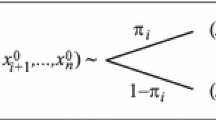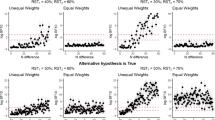Abstract
Ellsberg (The Quarterly Journal of Economics 75, 643–669 (1961); Risk, Ambiguity and Decision, Garland Publishing (2001)) argued that uncertainty is not reducible to risk. At the center of Ellsberg’s argument lies a thought experiment that has come to be known as the three-color example. It has been observed that a significant number of sophisticated decision makers violate the requirements of subjective expected utility theory when they are confronted with Ellsberg’s three-color example. More generally, such decision makers are in conflict with either the ordering assumption or the independence assumption of subjective expected utility theory. While a clear majority of the theoretical responses to these violations have advocated maintaining ordering while relaxing independence, a persistent minority has advocated abandoning the ordering assumption. The purpose of this paper is to consider a similar dilemma that exists within the context of multiattribute models, where it arises by considering indeterminacy in the weighting of attributes rather than indeterminacy in the determination of probabilities as in Ellsberg’s example.
Similar content being viewed by others
References
Arlo-Costa, H. and Helzner, J. (2005), Comparative ignornace and the ellsberg phenomenon, in Cozman, F., Nau, R. and Seidenfeld, T. (eds.), Proceedings of the Fourth International Symposium on Imprecise Probabilities and their Applications, pp. 21–30.
Ellsberg D. (1961). Risk, ambiguity, and the savage axioms. The Quarterly Journal of Economics 75, 643–669
Ellsberg, D. (2001), Risk, Ambiguity and Decision, Garland Publishing.
Gardenfors P. and Sahlin N. (1982), Unreliable probabilities, risk taking, and decision making. Synthese 53, 361–386
Kahn B. and Meyer R. (1991), Consumer multiattribute judgments under attribute-weight uncertainty. Journal of Consumer Research 17, 508–522
Keeney, R. and Raiffa, H. (1993), Decisions with Multiple Objectives, Cambridge University. The Cambridge edition is a republication of the 1976 work.
Keynes, J. (1921), A Treatise on Probability, MacMillan.
Klein, J. (2007), New york city gifted and talented program test information 2007-2008: For students in pre-kindergarten, kindergarten, 1st grade and 2nd grade, Technical Report, New York City Department of Education.
Knight, F. (1921), Risk, Uncertainty and Profit, Houghton-Mifflin.
Kreps, D. (1988), Notes on the Theory of Choice, Westview.
Kyburg H. (1968), Bets and beliefs. American Philosophical Quarterly 5, 63–78
Levi I. (1974), On indeterminate probabilities. Journal of Philosophy 71, 391–418
Levi, I. (1980), The Enterprise of Knowledge, MIT Press.
Levi I. (1986), The paradoxes of allais and ellsberg. Economics and Philosophy 2, 23–53
Luce, R. and Raiffa, H. (1989), Games and Decisions: Introduction and Critical Survey, Dover Publications. The Dover edition is a republication of the 1957 work.
Ray P. (1973), Independence of irrelevant alternatives. Econometrica 32, 987–991
Seidenfeld T. (1988), Decision theory without ‘independence’ or without ‘ordering’: What is the difference?. Economics and Philosophy 4, 267–290
Sen, A. (1970), Collective Choice and Social Welfare, Holden Day.
Sen A. (1971), Choice functions and revealed preference. Review of Economic Studies 38(3): 307–317
Weber M. (1985), A method of mutliattribute decision making with incomplete information. Management Science 31(11): 1365–1371
Wilkie W. and Pessemier E. (1973), Issues in marketing’s use of multi-attribute models. Journal of Marketing Research 10(4): 428–441
Author information
Authors and Affiliations
Corresponding author
Rights and permissions
About this article
Cite this article
Helzner, J. On the Application of Multiattribute Utility Theory to Models of Choice. Theory Decis 66, 301–315 (2009). https://doi.org/10.1007/s11238-008-9099-x
Received:
Accepted:
Published:
Issue Date:
DOI: https://doi.org/10.1007/s11238-008-9099-x




